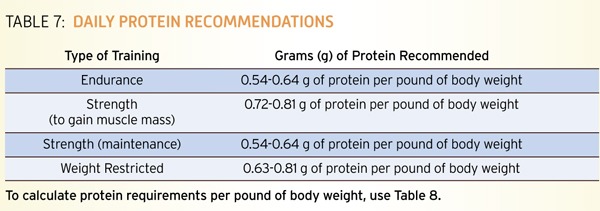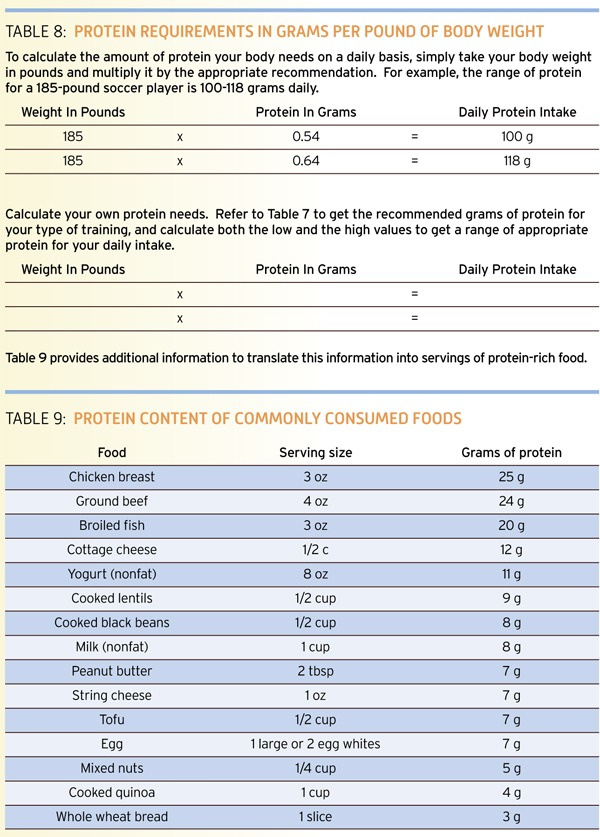Chocolate Rain
MuscleChemistry Registered Member
Protein has always been a particularly popular nutrient with athletes because of its role in building and maintaining muscles. Indeed, athletes need to consume a wide variety of high-quality protein foods in their diets. However, while protein is necessary, it is not the primary fuel for working muscles, and consuming more protein than what the body can use is not going to give athletes larger and stronger muscles. While research shows that protein requirements are higher for athletes to aid in muscle repair and growth, most athletes are already consuming more protein than the body can use. Use the following formulas as guidelines to ensure proper amounts of protein are included in your dietary intake.
[h=3]
 Building Body Mass[/h]Many athletes want to add more bulk to their bodies in the form of lean muscle. Many supplement products claim to build muscles. Athletes should take special caution when considering supplementation (please see pages 16-21 for additional information and cautions). Due to the limited regulations of the dietary supplement industry, there is a risk of products being contaminated with sport-prohibited or unknown substances with or without the manufacturer knowing. There is no guarantee that the product contents match with those listed on the label. Taking a lot of extra protein either from supplements or food does not guarantee bigger muscles. If it did, athletes could spend time lounging instead of lifting to build muscles.
Building Body Mass[/h]Many athletes want to add more bulk to their bodies in the form of lean muscle. Many supplement products claim to build muscles. Athletes should take special caution when considering supplementation (please see pages 16-21 for additional information and cautions). Due to the limited regulations of the dietary supplement industry, there is a risk of products being contaminated with sport-prohibited or unknown substances with or without the manufacturer knowing. There is no guarantee that the product contents match with those listed on the label. Taking a lot of extra protein either from supplements or food does not guarantee bigger muscles. If it did, athletes could spend time lounging instead of lifting to build muscles.
A healthier regimen for building muscles would include:
Following a strength training program that challenges muscles
Adding 500 to 1,000 more calories each day to current dietary intake, to allow the body to use protein already present in the diet for muscle growth and not be broken down to fuel activity
Eating foods that are both high in carbohydrates and proteins like grilled chicken sandwiches, peanut butter sandwiches, and Greek yogurt with granola
Choosing low-fat sources of both carbohydrates and protein
Eating several small meals that include about 30 grams of protein throughout the day will support training and muscle-building
Choosing lean animal sources of protein (i.e. dairy and meats) which are more efficiently absorbed by the body
[h=3]Protein After Exercise[/h]The body’s ability to recover from games, practices, or intense workouts requires adequate rest and proper nutrition. An important component of the recovery process is consuming both carbohydrates and protein shortly after exercise to restore muscle glycogen and stimulate muscle protein synthesis.
[h=3]EAT[/h]Keep in mind that food is fuel and athletes should not come to practice or games without having had enough food to support the energy requirements for their sport. To keep athletes properly fueled and have protein needs met, use the EAT guidelines:
Eat breakfast. It is the best way to start the day well fueled. Include foods that contain carbohydrates and protein such as nonfat milk, yogurt, or eggs.
Add carbohydrates and protein to post-exercise meals. Some energy bars provide carbohydrates to replenish muscle glycogen stores and protein to help build and repair muscles.
Toss the supplements. Athletes should rely on protein from food sources first, instead of supplements. This helps ensure that diets are balanced for health and performance. In addition to meat sources of protein, dairy products, nuts, and seeds are all rich sources of protein and can easily be added to any meal or snack.
[h=3]

 Building Body Mass[/h]Many athletes want to add more bulk to their bodies in the form of lean muscle. Many supplement products claim to build muscles. Athletes should take special caution when considering supplementation (please see pages 16-21 for additional information and cautions). Due to the limited regulations of the dietary supplement industry, there is a risk of products being contaminated with sport-prohibited or unknown substances with or without the manufacturer knowing. There is no guarantee that the product contents match with those listed on the label. Taking a lot of extra protein either from supplements or food does not guarantee bigger muscles. If it did, athletes could spend time lounging instead of lifting to build muscles.
Building Body Mass[/h]Many athletes want to add more bulk to their bodies in the form of lean muscle. Many supplement products claim to build muscles. Athletes should take special caution when considering supplementation (please see pages 16-21 for additional information and cautions). Due to the limited regulations of the dietary supplement industry, there is a risk of products being contaminated with sport-prohibited or unknown substances with or without the manufacturer knowing. There is no guarantee that the product contents match with those listed on the label. Taking a lot of extra protein either from supplements or food does not guarantee bigger muscles. If it did, athletes could spend time lounging instead of lifting to build muscles.A healthier regimen for building muscles would include:
Following a strength training program that challenges muscles
Adding 500 to 1,000 more calories each day to current dietary intake, to allow the body to use protein already present in the diet for muscle growth and not be broken down to fuel activity
Eating foods that are both high in carbohydrates and proteins like grilled chicken sandwiches, peanut butter sandwiches, and Greek yogurt with granola
Choosing low-fat sources of both carbohydrates and protein
Eating several small meals that include about 30 grams of protein throughout the day will support training and muscle-building
Choosing lean animal sources of protein (i.e. dairy and meats) which are more efficiently absorbed by the body
[h=3]Protein After Exercise[/h]The body’s ability to recover from games, practices, or intense workouts requires adequate rest and proper nutrition. An important component of the recovery process is consuming both carbohydrates and protein shortly after exercise to restore muscle glycogen and stimulate muscle protein synthesis.
[h=3]EAT[/h]Keep in mind that food is fuel and athletes should not come to practice or games without having had enough food to support the energy requirements for their sport. To keep athletes properly fueled and have protein needs met, use the EAT guidelines:
Eat breakfast. It is the best way to start the day well fueled. Include foods that contain carbohydrates and protein such as nonfat milk, yogurt, or eggs.
Add carbohydrates and protein to post-exercise meals. Some energy bars provide carbohydrates to replenish muscle glycogen stores and protein to help build and repair muscles.
Toss the supplements. Athletes should rely on protein from food sources first, instead of supplements. This helps ensure that diets are balanced for health and performance. In addition to meat sources of protein, dairy products, nuts, and seeds are all rich sources of protein and can easily be added to any meal or snack.



